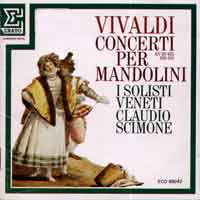


She offers to surrender herself in marriage to the warrior who can kill Rinaldo, thus causing the Muslim leaders (represented in the opera by Adrasto, Emireno, and Tisaferno) to quarrel in jealousy. In Canto 17, as the Caliph of Cairo, Godfrey's principal enemy, assembles his army in Egpyt - drawn from throughout the Muslim world - Armida arrives in her winged chariot, followed by an impressive retinue ("Her chariot like Aurora's glorious wain, / With carbuncles and jacinths glistered round: / Her coachman guided with the golden rein / Four unicorns, by couples yoked and bound"). Librettist Giovanni Palazzi picks up the story of Armida after the two knights have rescued Rinaldo from her enchanted island: as at the memorable end of Lully and Gluck's Armide, when the sorceress destroys her palace in rage and flies off in a winged chariot.

Tasso's sprawling work intertwines many narrative strands, and Vivaldi chose to set a secondary episode that is somewhat unusual. As we have come to expect of Alessandrini's hand at the rudder, the performances are fleet of tempo, taut of ensemble, and just so slightly on edge (for example, in the frenetic fast sections of the overture), drawing a maximum of color from the strings-only ensemble (two horns are occasionally added) - what Vivaldi had to work with because of the smallness of the pit at Venice's Teatro San Moisè, where Armida al campo d'Egitto was premiered during the 1718 Carnival season. Rinaldo Alessandrini and his historically informed performance (HIP) ensemble Concerto Italiano return to the project some years after their first full opera contribution, L'Olimpiade.

Add to that list the latest installment from Naïve's Vivaldi Edition, the fruit of a quixotic project to record all of Antonio Vivaldi's work, as found in the manuscripts discovered in the Biblioteca Nazionale Universitaria di Torino. Opera composers have turned again and again to Torquato Tasso's late Renaissance fantasy epic Gerusalemme liberata (translated in English as Jerusalem Delivered): Handel's Rinaldo and Armida abbandonata, Gluck's Armide, Monteverdi's Combattimento di Tancredi e Clorinda, and Lully's Armide, to name but a few.


 0 kommentar(er)
0 kommentar(er)
